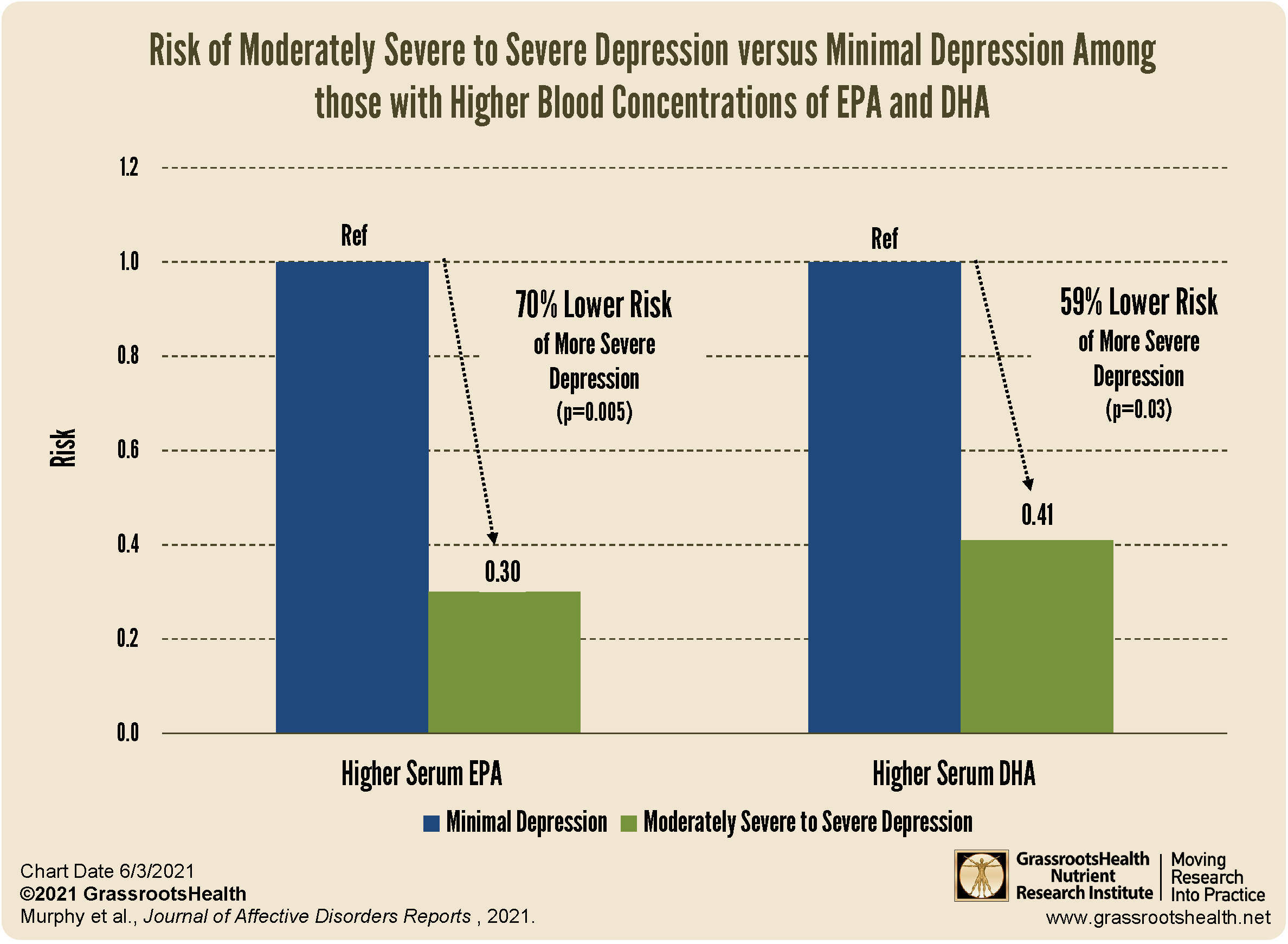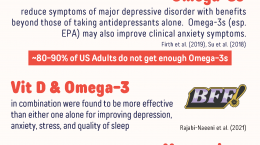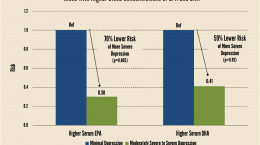Published on September 10, 2021
September 10 is World Suicide Prevention Day – How could nutrients help?
 “One in every 100 deaths worldwide is the result of suicide.”
“One in every 100 deaths worldwide is the result of suicide.”
World Suicide Prevention Day is observed on September 10th to bring awareness to what can be done to help reduce the instances of suicide and suicide attempts around the world. Suicide is a complex issue, and addressing the problem may require multiple interventional and therapeutic options, as well as a personal approach. While the factors and causes that contribute to the risk of suicide are many, mental health conditions such as anxiety and depression can be among those that make a person more vulnerable to suicide.
An estimated 50% of Americans and Canadians are diagnosed with a mental disorder at some point in their lifetime, however, the crisis has been even greater during the COVID-19 pandemic, with an observed increase in incidence of anxiety, depression, post-traumatic stress disorder and suicide.
Today, we review how certain nutrients and lifestyle interventions may reduce the risk of both anxiety and depression, to help improve overall mental health and wellbeing.
Vitamin D, Sunshine, and Mental Health
Many studies have shown a link between higher vitamin D levels and improved mental health and well-being. One study in particular looked at the relationship between vitamin D levels and mental health conditions such as depression, anxiety, and stress, and found that all measured indicators of mental health (emotional health, self-perceived mental health, self-perceived general health, and self-perceived stress) were positively associated with higher vitamin D levels.
A meta-analysis found that studies in which vitamin D supplementation resulted in improved vitamin D levels saw reduced depressive symptoms with an effect size that was comparable to that of anti-depressant medication.
Exposure to sunshine or UVB has also been shown to be correlated with significant improvements in mood scores. Light therapy, or exposure to artificial UV lamps, is an effective treatment for people with a specific type of depression called Seasonal Affective Disorder (SAD), improving symptoms by 50-80%.
Other Nutrients to Help Regulate Stress and Depression
Omega-3 Fatty Acids
The effect of omega-3 fatty acids on depression have been backed by the strongest level of evidence through the world’s largest review (called a meta-synthesis) of nutrient supplements and mental disorders. This study showed the effect of omega-3s (with an average dose of 1422 mg/day of EPA) on reducing symptoms of Major Depressive Disorder, which produced benefits beyond those of taking antidepressants alone. The strongest effect was seen with omega-3 supplements that contained at least 50% EPA.
Another study used the NHANES 2011–2012 data set to determine the association between concentrations of EPA, DHA, and total long chain omega-3 fatty acids in the blood and the severity of depression symptoms. The study found that the risk of moderately severe to severe depression decreased with higher levels of omega-3 fatty acids in the blood, and the association remained significant after adjustments were made for sex, age, race/ethnicity, education, marital status, poverty to income ratio, and smoking status.
The chart above shows the reduced risk of moderately severe to severe depression versus minimal depression among individuals with higher blood concentrations of EPA and DHA. Once again, EPA specifically was found to have a significant relationship to depressive symptoms, with a 70% decreased risk of moderately severe to severe depression versus minimal depression for those with higher EPA levels, and a 61% decreased risk of very or extreme difficulty with daily tasks due to depressive symptoms.
Higher levels of DHA were also significantly associated with a lower risk of moderately severe to severe depression relative to minimal depression, with a 59% reduced risk, suggesting that both DHA and EPA omega-3 fatty acids are important for mental-emotional wellness.
Magnesium
 Magnesium has been demonstrated to have a major effect on stress and have antidepressant properties, with multiple studies linking magnesium intake and risk of depression and anxiety. One clinical trial assessed whether magnesium supplementation improved depression and anxiety symptoms in adults with mild-to-moderate depression and found a significant improvement in depression and anxiety symptoms among those taking magnesium, whereas no improvement was seen without magnesium. Also, symptom improvement was observed within two weeks of supplementation.
Magnesium has been demonstrated to have a major effect on stress and have antidepressant properties, with multiple studies linking magnesium intake and risk of depression and anxiety. One clinical trial assessed whether magnesium supplementation improved depression and anxiety symptoms in adults with mild-to-moderate depression and found a significant improvement in depression and anxiety symptoms among those taking magnesium, whereas no improvement was seen without magnesium. Also, symptom improvement was observed within two weeks of supplementation.
Another study looked at individuals with moderate to severe stress to see how treatment with magnesium or magnesium plus vitamin B6 affected perceived stress levels – rapid and significant reductions in stress were found for all those taking magnesium. There was a 24% greater improvement in stress in the magnesium with vitamin B6 group for those who had severe or extremely severe stress.
Zinc and Copper
Zinc has been labeled as one of the most important trace elements in the body, and is an essential nutrient necessary for the proper function of many physiological processes, including neurological functioning. Previous studies have found an increased incidence of zinc deficiency among individuals with anxiety and depression. Prolonged deficiency of zinc has been shown to cause emotional instability, irritability, and depression.
One study looking at the relationship of zinc and copper to anxiety symptoms found significantly higher levels of copper and copper:zinc ratio, as well as lower levels of zinc, among those with anxiety. A minimum of 8 weeks of zinc and vitamin B-6 therapy given to anxiety patients resulted in normalized levels of zinc and a decrease in the copper:zinc ratio, as well as a significant improvement in anxiety symptoms, with anxiety symptom ratings decreasing by 31%.
The Connection Between Inflammation and Emotional Wellness
Mental disorders, such as depression, anxiety, substance abuse, and schizophrenia, have been associated with chronic inflammation as well as vitamin D deficiency. The findings of one meta-analysis showed a significant reduction in depression and improved quality of sleep after vitamin D supplementation. Results also showed a significant reduction in CRP (a measure of inflammation levels in the body) following vitamin D supplementation.
Managing chronic inflammation is extremely important for diseases associated with the brain and nervous system. Multiple studies have found a direct correlation between high levels of inflammation and increased incidence of mental-emotional health problems. Previously, we reviewed a study assessing the effects of chronic inflammation on cognitive health, where higher levels of C-reactive protein (CRP) were related to an increase in cognitive decline. Vitamin D is known to be associated with the risk of many of these inflammation-based diseases, with higher levels of vitamin D associated with lower levels of inflammatory markers and lower disease risk.
Take Action Today to Improve Health for the Future
Whether for yourself or a loved one, having and maintaining healthy nutrient levels can lead to better health now and for the future.
 Choose which to measure, such as your vitamin D, omega-3s, and essential minerals including magnesium and zinc, by creating your custom home test kit today. Take steps to improve the status of each of these measurements to benefit your overall health. You can also track your own intakes, symptoms and results to see what works best for YOU.
Choose which to measure, such as your vitamin D, omega-3s, and essential minerals including magnesium and zinc, by creating your custom home test kit today. Take steps to improve the status of each of these measurements to benefit your overall health. You can also track your own intakes, symptoms and results to see what works best for YOU.
Enroll and test your levels today, learn what steps to take to improve your status of vitamin D (see below) and other nutrients and blood markers, and take action! By enrolling in the GrassrootsHealth projects, you are not only contributing valuable information to everyone, you are also gaining knowledge about how you could improve your own health through measuring and tracking your nutrient status, and educating yourself on how to improve it.






